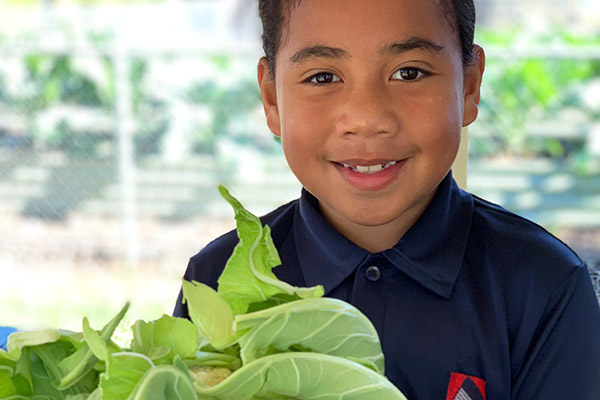Market garden teaches students about growing, selling, giving
It’s a Wednesday morning at Toronto Adventist School. A group of students is working in a market garden to fill orders placed by their parents. The students not only grow the seasonal vegetables but also harvest, weigh and bundle them for sale. They collect money, calculate change, and bag orders then write their activities in a journal and record and graph sales.
The experience is a positive way to help children learn about financial literacy, research by our academics shows. This is important because financial literacy helps children “deal with finances in a way that brings security and stability to their standard of living.”
A qualitative study, led by Dr Peter Williams from Avondale Business School and published in the journal Education 3-13, lists the benefits of the market garden as providing: a consistency of financial literacy education; a repetition of money transaction skills; a practical application of financial literacy skills in an authentic learning context, and; a transfer of financial concepts and skills from school to home. It is preparing them “at a foundational level for ‘participation in economic life.’”
Growing and selling
As the students grow, so does their understanding of how finance works. One in the 5-6-year-old group understood the need to weigh produce to ensure “people get the same amount.” Another aged 6-8 understood the importance of helping the consumer feel good. “On the back of the order [we write] ‘Thank you’ and draw a heart or smiley faces.” An 8-10-year-old’s comment—“If they don’t have enough money at the time, they can get the things and then they have to pay it back later”—showed a simple understanding of debt. Students aged 10-12 years saw the need to plan. “We know how much produce to pick because we send out order forms the day before.”
Students work in the shop on a rotation basis. Other weeks they work in the garden, composting, weeding or watering garden beds, and planting seedlings. This helps them appreciate the value of consumer products and develop a good work ethic. “It is teaching the children that . . . what we do is worth something,” says one of the market garden community volunteers. “It’s valued.” The volunteer saw evidence of this when the older students gave a visiting local parliamentarian a gift: “a watering can packed full of veggies they helped grow.”
The market garden helps parents have conversations at home about finance. One says their children are applying financial concepts and using financial vocabulary, becoming quicker at financial calculations, and thinking more about financial decision-making. “They’re starting to be aware that things are not free in life, and that there is a difference between what you make and what you need.” Another gets their children to help buy produce from the shop. “They look through my wallet and say, ‘Well, we’ve got $10.’ I’m like, ‘Excellent. So, how much change are you going to get and are we getting value for money?’ . . . They’re thinking in advance about what we’re going to need and how it’s going to last.” Some reported their children making cost comparisons while shopping.
Giving
For one student in the 6-8-year-old group, learning financial literacy is more about how they can better help others. “I have learned to give and help those people that don’t have any money.”
The school tithes, giving 10 per cent of sales to the church on the campus. A parent who tithes says their children are confidently transferring knowledge about the biblical principle from school to home. “If I give them money for doing some chores and say, ‘Take the tithe of that’, they’ll go, ‘Oh, that’ll be . . . .’ It comes so quickly.”
The rest of the money from the market garden buys items such as fencing, raised beds and tools. The school is also saving for an automated watering system. Although students had little understanding of how the school used profits, they are, according to one teacher, motivated to increase sales. The graphing of financial data says to the students, “‘We’ve got low sales. That’s a bit disappointing. What can we do to fix that?’”
Improving
Peter and his co-authors Dr Jason Morton and Beverly Christian from the School of Education and Science recommend the school improve record keeping and involve students more in managing the program.
They suggest setting sales or tithe goals and tying these with an infrastructure spend or a charitable cause so students can see where the money goes. Let students choose what vegetables to plant and when, what tools to buy or replace, and how to promote the sale of produce. Establish a committee of students guided by teachers to set competitive prices, think of strategies for increasing sales, and manage human resources, including the volunteers. Exploring the concept of profit and introducing statistical measures like averages to communicate progress to stakeholders could also improve the program.
The market garden is part of an emerging nature-based program at Toronto. “One of the best assets here is our beautiful bush setting,” says principal Charmony Dias. “It’s calming. The students feel it, too—their behaviour changes after being outside.”
Charmony feels proud reading the paper, even though it includes recommendations for improvement. “It shows me that we’re innovative and community orientated. And look, if you’re not prepared to learn new things, you shouldn’t be in education.”
Share

